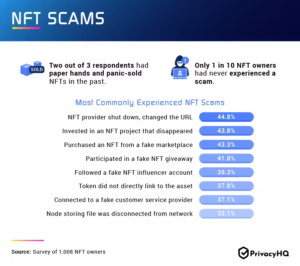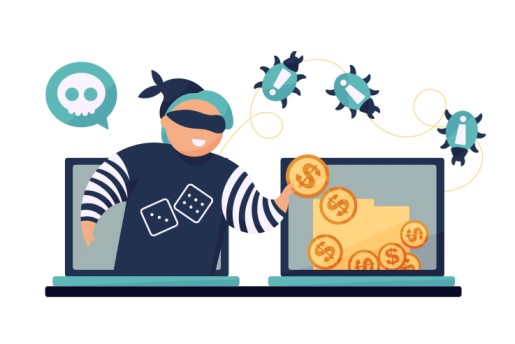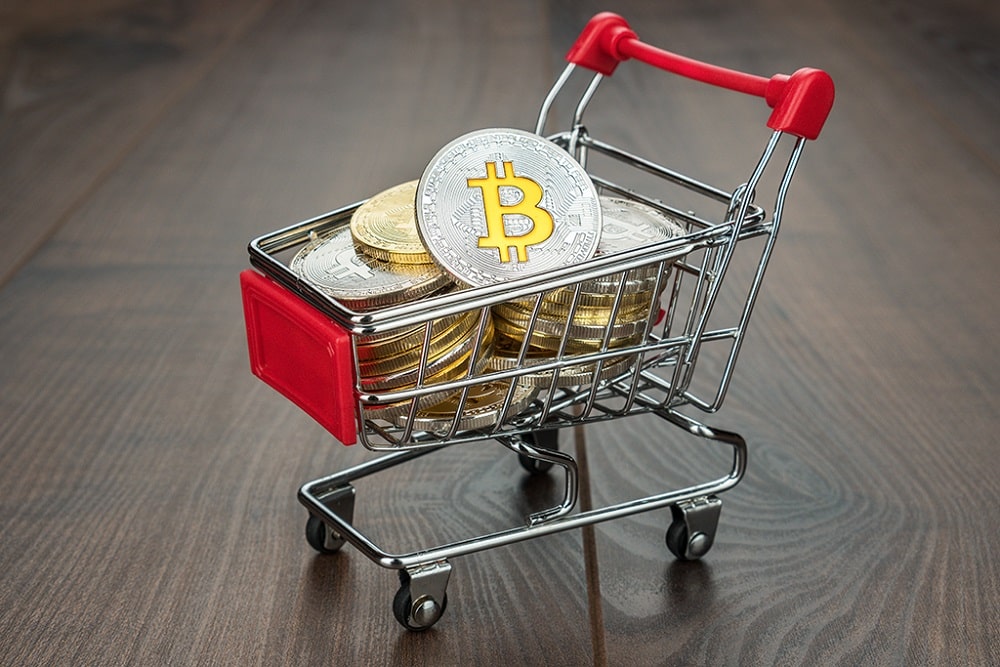If you’re not into NFTs so far, you probably have mixed feelings about investing in NFTs in 2023. And your feelings are justified – it is enough just to look at the NFT market right now or the crypto market (because usually, the success of the NFT market is in relation to the crypto market and blockchain technology) to see how challenging these times and this bear market is.
However, it is possible to think about one thing: the wealthiest people in the world always suggest investing in hard times.
If you want to put the wisdom of the wealthiest people into practice and genuinely believe in the power of NFTs, you must know how to avoid NFT scams because many bad actors want your money.
That’s why, in this article, we will dive into NFT Scams, exploring common NFT scams and the most dangerous NFT scams out there in 2023 to help you make the right decisions and avoid losing your money.
What is an NFT Scam?
An NFT scam refers to any fraudulent or misleading activity related to Non-Fungible Tokens (NFTs) made to obtain undue advantage, often money.
Also in this category are NFTs that don’t represent ownership or proof of authenticity of a unique item or piece of content – basically, the principles that stay at the foundation of NFTs.
The market of NFT scams has been extended since the NFTs became more and more attractive and traded. Once NFTs became popular, more and more scammers appeared to steal the money through different methods, some more creative than others. As an idea, since NFTs became popular, nine out of 10 respondents to a PrivacyHQ survey said that they experienced an NFT scam.

NFT scams can take various forms, and they usually aim to deceive or defraud individuals in the NFT marketplace.
Common NFT Scams in 2023
1. Rug-Pull Scams
A rug-pull is a well-known and used scam (in the crypto and NFT industry) where people promote an NFT as something great, get lots of money from investors, and then disappear. These scammers behind such a project usually use social media to make people trust the NFT and get excited about it. Once they have enough money, they close the whole project and take all the money.
In a different type of rug-pull, the scammers change the NFT code so that people who own it can’t sell it anymore. In this case, the creators might make much money from the initial sales, but the investors lose out.
For instance, relatively recently, Jake Paul promoted “The Animoon” project, but it turned out to be a rug-pull that cost investors $6.3 million, this project being just another NFT scam in a long line of such projects promoted by Jake Paul.
2. Plagiarized, Counterfeit or Duplicated NFTs
This situation happens when bad actors take an artist’s work, either by stealing it or making a copy, and then create a fake version on an NFT marketplace, like OpenSea. They just put these fake artworks up for sale in an auction. These NFT scams can be very convincing; someone might buy one, thinking it’s the real deal.
Eventually, the people who bought these fake copies realize they’ve been tricked into getting worthless art pieces. Sadly, once you buy one, you cannot undo it!
To show you how big this problem is, OpenSea, a popular NFT platform, said in June 2022 that more than 80% of NFTs created using its tool were fake. So, there’s a high chance that if you buy an NFT, it might be a stolen copy of a real-world artist’s work.
Here’s a simple example related to the artist Aja Trier as an illustration.
86 thousand times people have stolen my art and listed them on @opensea and they even had the gall to make a collection like a giant middle finger to my IP rights. Wtf?#nft #arttheft #opensea #infringement #nftcommunity pic.twitter.com/LY5Jxb2N2r
— Aja Trier (@AjaArt) January 5, 2022
3. NFT Giveaways or Airdrop Scams
Before explaining this scam, it’s crucial to know that not all NFT giveaways or airdrops are scams. There are many genuine projects out there. That’s why NFT giveaways can be profitable if you learn about them from trusted sources with a good history.
However, you should know that if you don’t turn to these sources, you’ll likely get screwed. How? Well, in this type of NFT scam, scammers usually pretend to be real NFT trading websites on social media. They use this disguise to promote NFT giveaway campaigns, also called airdrops.
Here’s how it works: They promise to give you a free NFT if you help spread their message and register on their website. They’ll ask you to connect your wallet to get your prize. However, while you’re doing this, they secretly record the information you enter. Once they have your details, they can access your NFT collection and steal your NFTs.
So, be very cautious when you see offers like this online because they could be trying to steal your valuable NFTs, and always choose only reputable websites for research when you want to get into NFT giveaways or airdrops.
The Most Dangerous NFT Scam in 2023
Phishing scams are among the most used in the NFT and wider cryptocurrency communities. They’re also considered one of the most dangerous NFT scams in 2023. Why? Well, when someone falls for a phishing scam, they can lose everything, not just the money they put into an NFT. That’s because scammers can get a lot of personal information, like bank accounts and crypto wallet details, and even take control of your device (with everything in it).
Also, phishing scams make up nearly 22% of all data breaches, earning them a significant spot as one of the most widespread cybercrimes, according to the FBI’s 2021 IC3 Report.
But what exactly are NFT phishing scams? These scams involve fake, malicious websites that try to steal your crypto assets in one of two main ways:
- They show a fake pop-up that looks like the login page of a trusted wallet provider. When you enter your login details, the scammers grab them.
- They scam you into approving malicious transactions. The scammers pretend to be a legit NFT project and make you sign something that lets them take your NFTs. They use a function called “SetApprovalForAll” in the ERC721 and ERC1155 standards, which lets others manage your assets if you approve it.
To get people to click on their scams, bad actors often play on the fear of missing out (FOMO). This is a big deal in the NFT world because some collections can quickly shoot up in value. People want to grab deals fast, and scammers use this rush to make people act without thinking.
Phishing links can be used in lots of different ways. As people have gotten smarter about the usual scams, bad actors have come up with more creative and deceptive practices to fool people.
We strongly recommend never providing your wallet keys through pop-ups or questionable websites. Instead, always visit trusted websites directly when conducting cryptocurrency or NFT transactions. Avoid using links, pop-ups, or email prompts to enter your wallet’s key information.
Conclusion
While the mentioned NFT scams aren’t the only ones out there, they’re definitely the ones you’re most likely to come across, with phishing being the most prevalent.
If you plan on collecting NFTs in the near future, keep an eye out for the ones discussed here to steer clear of possible scams. Don’t invest without doing your homework and ensuring you have more than just basic information about the assets you’re investing in.
- Crypto Price Update July 24: BTC Maintains $66K, ETH at $3.4K, XRP, TON, and ADA Rallies
- Bitcoin Falls to $65K as Mt. Gox Transfers $2.8 Billion BTC to External Wallet
- News of Marathon Digital’s $138 Million Fine for Breach of Non-Disclosure Agreement Triggers a Bearish 2.5% of Its MARA Stock
- Are $530M Bitcoin ETF Inflows a Blessing or Caution?
- Metaplanet Teams with Hoseki for Real-Time Bitcoin Holdings Verification
- Building Secure Blockchain Systems: An Exclusive Interview with ARPA and Bella Protocol CEO Felix Xu
- Building The “De-Facto Crypto Trading Terminal”: An Exclusive Interview with Aurox CEO Giorgi Khazaradze
- Building a New Global Financial System: An Exclusive Interview With Tyler Wallace, Analytics Head at TrustToken
- “Solana is the Promised Land for Blockchain” — An Exclusive Interview with Solend Founder Rooter
- El Salvador: Where The Bitcoin Revolution Begins With A Legal Tender

 Why Trust Us
Why Trust Us







